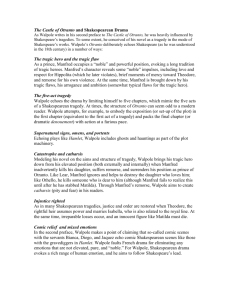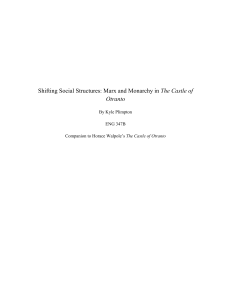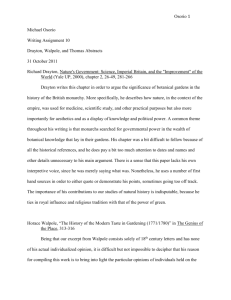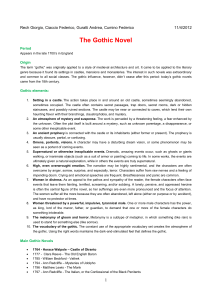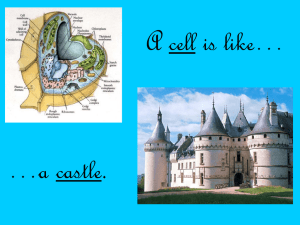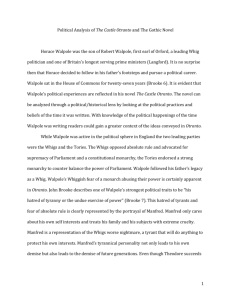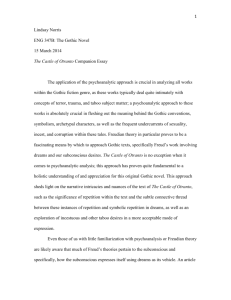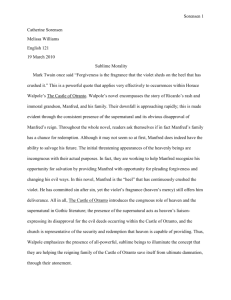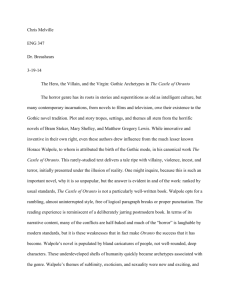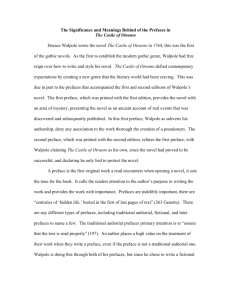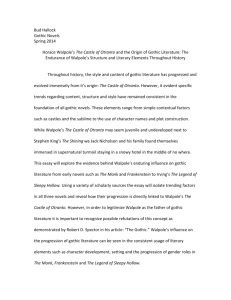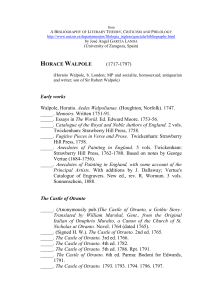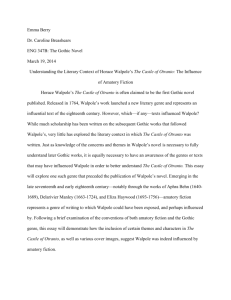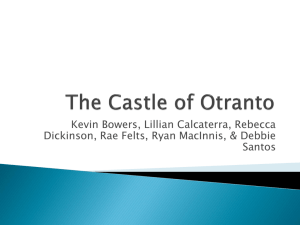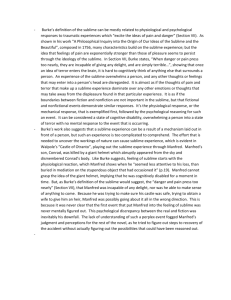ReadingResponse2
advertisement
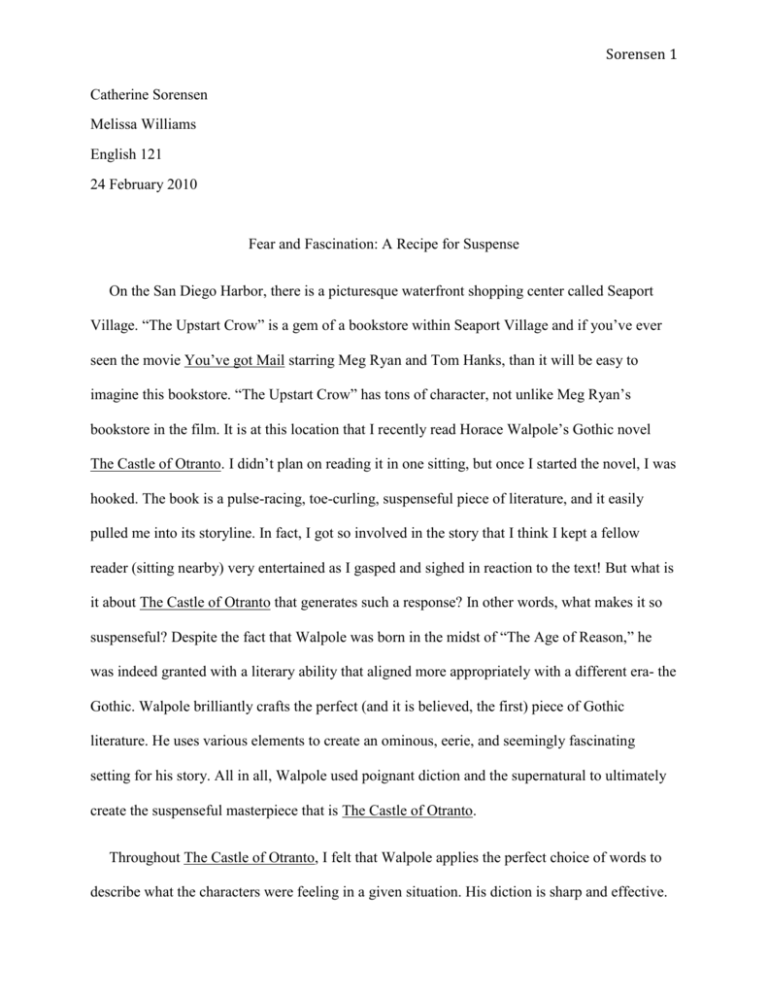
Sorensen 1 Catherine Sorensen Melissa Williams English 121 24 February 2010 Fear and Fascination: A Recipe for Suspense On the San Diego Harbor, there is a picturesque waterfront shopping center called Seaport Village. “The Upstart Crow” is a gem of a bookstore within Seaport Village and if you’ve ever seen the movie You’ve got Mail starring Meg Ryan and Tom Hanks, than it will be easy to imagine this bookstore. “The Upstart Crow” has tons of character, not unlike Meg Ryan’s bookstore in the film. It is at this location that I recently read Horace Walpole’s Gothic novel The Castle of Otranto. I didn’t plan on reading it in one sitting, but once I started the novel, I was hooked. The book is a pulse-racing, toe-curling, suspenseful piece of literature, and it easily pulled me into its storyline. In fact, I got so involved in the story that I think I kept a fellow reader (sitting nearby) very entertained as I gasped and sighed in reaction to the text! But what is it about The Castle of Otranto that generates such a response? In other words, what makes it so suspenseful? Despite the fact that Walpole was born in the midst of “The Age of Reason,” he was indeed granted with a literary ability that aligned more appropriately with a different era- the Gothic. Walpole brilliantly crafts the perfect (and it is believed, the first) piece of Gothic literature. He uses various elements to create an ominous, eerie, and seemingly fascinating setting for his story. All in all, Walpole used poignant diction and the supernatural to ultimately create the suspenseful masterpiece that is The Castle of Otranto. Throughout The Castle of Otranto, I felt that Walpole applies the perfect choice of words to describe what the characters were feeling in a given situation. His diction is sharp and effective. Sorensen 2 As a result, his word choice plays a major role in setting up the sensations for suspense. For instance, in the scene where Isabella is escaping from Manfred through the dark and terrifying subterraneous passages, you can almost feel her nerves on edge. She is desperate to free herself from the threat that Manfred poses and every sound “struck her with new terror” (Pg 27). At one point, she thought she heard footsteps and Walpole describes her reaction: “Her blood curdled” (Pg 28). Curdled! That is the perfect word to describe the intense fear and anxiety that Isabella is experiencing (and that the audience is experiencing, for that matter). Soon after, Isabella is so stressed from the situation that it got to the point that “she was ready to sink under her apprehensions” (Pg 29). Walpole used the word “sink,” and it is an ideal representation of the overwhelming fear that penetrates Isabella- like the burden of an anchor. The fear Isabella is experiencing is a penetrating, uncontrollable, dizzying sensation and Walpole entirely illustrates this through his choice of words. Later on in the novel, a servant in the Castle of Otranto, Bianca, interrupts Manfred and Frederic in a wild frenzy to tell them that she had just witnessed the hand of a mighty giant! When describing her encounter with the giant, she says that she was in a “cold sweat” (Pg 104). Such a description is a vivid representation of the sensations that one would feel in a similar situation. A cold sweat is an oxymoron, yet it is the epitome of the body’s reaction to fear. Through this word choice, one can almost feel icy, chilling and glacial sensation juxtaposed with the warm, sticky and feverish sweat that accompanies intense dread. Millions of words exist in every language and when writing stories, the options for word choice seem endless. Walpole, however, proves that only certain words can be used to evoke the exact sensations that the characters are experiencing. Another factor within The Castle of Otranto that “quickens the pulse” is the presence of supernatural forces. Throughout the whole novel, heaven and the supernatural seem to be Sorensen 3 collaborating to display their disapproval for the occurrences within the Castle of Otranto. Paintings sigh, ghosts wander the corridors, and there are two sightings of a giant. As if that wasn’t enough, when Manfred and Jerome were arguing within the church, “drops of blood fell from the nose of Alfonso’s statue” (Pg 97). Jerome takes this as proof of the heaven’s disapprobation for Manfred’s evil schemes. The blood has no apparent origins, which seems to confirm the foreboding authority of the supernatural forces. Another scene that heightens the suspense of the novel is when the assembly of the Knights of Vicenza dines at the Castle of Otranto. Initially, their identity was uncertain. Manfred invites them into the castle and fruitfully attempts to win their favor. The ominous knights remain silent and unresponsive to Manfred’s efforts. This sense of uncertainty creates an exquisite desire to discover the true identity of the knights, and their purpose. The whole episode reminded me of the scene in Charles Dickens’ A Christmas Carol, where Ebenezer Scrooge is confronted by the third ghost: the “ghost of Christmas yet to come”. Out of all the ghosts that Scrooge encounters, the “ghost of Christmas yet to come” is the most menacing. The sole reason for this characterization is his silence. His lack of personality make his motives questionable and uncertain- just like the Knights that arrive at Otranto. This sense of uncertainty fuels the suspense within Walpole’s novel. It is one of the many nail-biting and tense scenes that result from the presence of the supernatural. Oscar Wilde once said, “The suspense is terrible. I hope it will last”. This comment is the perfect portrayal of the apprehension and fascination that simultaneously exist in regards to suspense and horror. Horace Walpole generated the suspense within The Castle of Otranto through his use of diction and the supernatural. These factors make Walpole’s novel eerie, morbid and sublime- which makes it all the more captivating. Sorensen 4 Work Cited Walpole, Horace. The Castle of Otranto. New Edition. New York: Oxford University Press, 1982. 17-115. Print.
